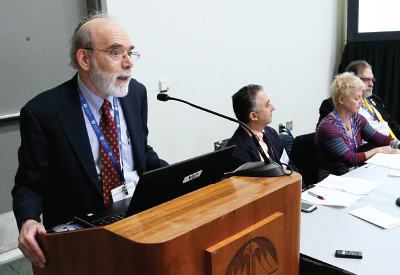“The Goldwater Rule is a masterpiece of contradictions,” said Jerrold Post, M.D., summing up the various—and occasionally contradictory—views held by psychiatrists about Section 7.3 of APA’s ethics code in a session at APA’s 2017 Annual Meeting in San Diego.
The fact that Section 7.3 of the Principles of Medical Ethics With Annotations Especially Applicable to Psychiatry continues to be a source of often heated discussion among psychiatrists may be testimony both to the current state of American political affairs and to a sense by some that this particular principle overly restricts members of the profession from legitimately expressing their views.
The Goldwater Rule, the popular name for Section 7.3, was developed after a number of psychiatrists declared during the 1964 presidential election that Sen. Barry Goldwater, the Republican candidate, was “psychologically unfit” to be president. Goldwater sued and won damages from Fact magazine, which had solicited the comments. The episode called into question the scientific grounding and the trustworthiness of the psychiatric profession.
Promulgated in 1973, Section 7.3 states that psychiatrists should not offer a “professional opinion” about a public figure without a face-to-face examination and obtaining that person’s consent. The annotation was intended to protect the subject of the statement from harm, to avoid discouraging potential patients from seeking treatment, and to prevent undermining the public’s perception of the psychiatric profession.
“The Goldwater Rule is a valuable component of the ethics of psychiatry,” said former APA President Paul Appelbaum, M.D., the Dollard Professor of Psychiatry, Medicine, and Law at Columbia University College of Physicians and Surgeons and a member of APA’s Committee on Judicial Action.
Appelbaum noted three challenges to the rule: that it inhibits public education about mental illness, that nonpsychiatrists offer diagnoses anyway, and that psychiatrists sometimes assess historical figures whom they have not examined personally.
“We can educate the public in general terms without labeling people,” said Appelbaum. “I’m less concerned about what a [nonpsychiatrist] journalist has to say. Mere observation through the media is inadequate and unreliable, because in making a diagnosis, we do more than check off symptoms.”
Post said he practices what, in its most recent iteration, is now an accepted exception to Section 7.3—the extended analyses of world leaders under controlled conditions of scholarship. Such was his job at the Central Intelligence Agency for 20 years. Post was praised by policymakers and excoriated by at least one psychiatrist for his public assessment in Congressional testimony of Saddam Hussein’s leadership abilities at the time of the Gulf War in 1991.
While Post said his experience could be valuable in the present political climate, he has declined media requests for comment in deference to APA’s official position. Nevertheless, he believes that psychiatrists have an ethical obligation to contribute to the public discussion on matters related to candidates for office. He also said that he thinks it is unfortunate that APA members cannot comment on opinions offered by nonprofessionals, such as reporters.
“The Goldwater Rule is more a guideline for etiquette than an enforceable moral dictum,” said Claire Pouncey, M.D., Ph.D., a private practitioner in Philadelphia. “When the Goldwater Rule functions as a gag rule, it is in itself unethical.”
Codes of ethics are important because they help elevate an occupation to a profession, said Pouncey. “The Goldwater Rule makes a good rule of thumb to remind psychiatrists of our shared professional standards,” she said. “But it denies a full moral role for psychiatrists by preventing the possibility of grappling with and justifying our own moral values and choices in a messy, imperfect world. It’s time to eliminate if from Section 7, not reinforce it, but the principle and the history are still instructive and should be taught.”
Section 7.3 was never intended to take away moral agency from psychiatrists, said Allen Dyer, M.D., Ph.D., a professor of psychiatry at George Washington University. He served on APA’s Ethics Committee when it first developed the statement in 1973.
“It’s not a rule; it’s a caveat,” he said. “We were formulating principles, not rules. We never intended to take away moral agency.”
Stigma and the shaky scientific underpinnings of psychiatry in the 1960s also played a role, said session chair Nassir Ghaemi, M.D., offering another argument for change.
“The rationale for the Goldwater Rule says that we don’t know what we’re doing,” said Ghaemi, a professor of psychiatry at Tufts University School of Medicine. “In 1964 and 1973, psychiatry was different; it was mostly psychoanalytic, and the need for an in-person evaluation was pushed by the psychotherapeutic approach, not by the diagnosis.”
He continued, “Political candidates have medical evaluations but not psychiatric examinations because of the assumption that a psychiatric condition is bad.” The implication of the Goldwater Rule is that even psychiatrists stigmatize psychiatric disorders. Some diagnoses might even be helpful. Depression may confer a sense of realism, and hypomania may spur creativity, for example. “The real question we should ask is, ‘What psychological traits make for good leaders once they come into office?’”
Former APA President Paul Summergrad, M.D., the Dr. Frances S. Arkin Professor and chair of the Department of Psychiatry at Tufts University School of Medicine, served as the session discussant. He observed that while physicians have the same right to free speech as other citizens, they gain authority but are also constrained by the role of their profession.
“Decisions made in a democracy, whether we like them or not, must be dealt with great seriousness and a sense of gravity, including commentary about public figures,” he said. “We must be circumspect. I come down on the side of restraint as part of our professional obligations. The Goldwater Rule is a good thing.” ■

